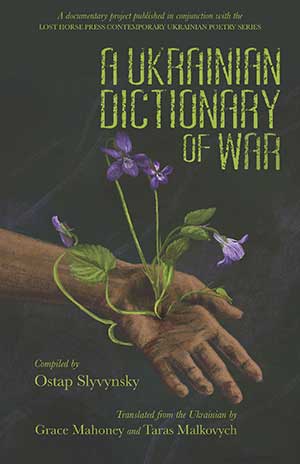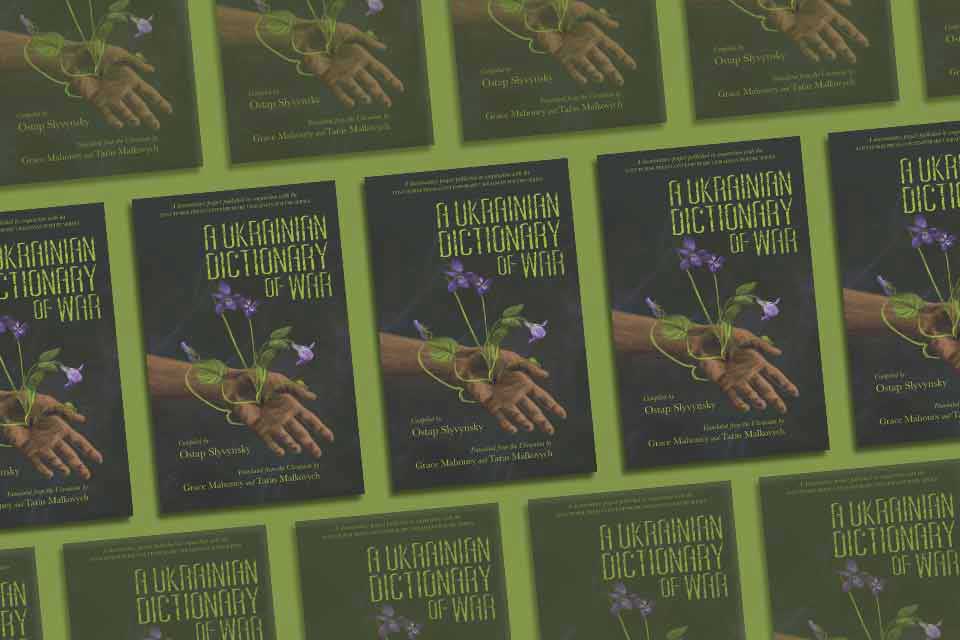The Seek for That means in Ostap Slyvynsky’s Ukrainian Dictionary of Warfare, by Nicole Yurcaba
 Like many different Ukrainian writers since 2022, Ostap Slyvynsky has answered a novel name of responsibility, one in every of cultural and lexicographical preservation. In his compilation A Ukrainian Dictionary of Warfare (2024), Slyvynsky preserves the voices of these pressured to depart their houses; of volunteers akin to medics, troopers, artists, and activists; of individuals interconnected by inexplicable grief, losses, ache, and turmoil. Translated from the Ukrainian by Grace Mahoney and Taras Malkovych and printed by Misplaced Horse Press, A Ukrainian Dictionary of Warfare—very like Oleksandr Mykhed’s The Language of Warfare—dissects how even the only phrase’s that means can change, remodel, and contract throughout occasions of immense and intense emotion.
Like many different Ukrainian writers since 2022, Ostap Slyvynsky has answered a novel name of responsibility, one in every of cultural and lexicographical preservation. In his compilation A Ukrainian Dictionary of Warfare (2024), Slyvynsky preserves the voices of these pressured to depart their houses; of volunteers akin to medics, troopers, artists, and activists; of individuals interconnected by inexplicable grief, losses, ache, and turmoil. Translated from the Ukrainian by Grace Mahoney and Taras Malkovych and printed by Misplaced Horse Press, A Ukrainian Dictionary of Warfare—very like Oleksandr Mykhed’s The Language of Warfare—dissects how even the only phrase’s that means can change, remodel, and contract throughout occasions of immense and intense emotion.
“My dreaming is extra actual than my waking,” says Stas from Kyiv within the entry titled “Bear.” Echoing different entries, Stas’s displays a nostalgic longing: “At present I needed to return to my childhood.” Stas shares that he “escaped” to “the place there isn’t any battle”: “to Makiivka, Ust-Kamenohorsk, and Zakarpattia of my childhood.” “You need to energy by means of with a view to assume towards actuality,” states Stas—a testomony to the myriad of the way Ukrainians have cast a mentality of dedication and resilience, one that’s knowledgeable by historic recollections of generational oppression.
Stas’s narrative mirrors that of Olia’s in “Tickets.” “I maintain pondering there’s a parallel life someplace. The place we’re as we had been earlier than the battle.” The tone of Olia’s ideas is kind of common amongst Ukrainians, one which establishes a standard thread in lots of A Ukrainian Dictionary of Warfare’s entries in addition to a thread of recognition about Ukraine’s budding social, cultural, and financial promise.
In “Housing,” Dmytro (additionally from Kyiv) remembers seeing “smashed kitchens, remnants of bedrooms, nursery wallpaper, items of mirrors hanging within the loos” as he checked out varied buildings. Satirically, an indication in entrance of one of many buildings stated, “Ultimately! Some inexpensive housing for you!” Dmytro’s expertise highlights a surreal actuality for Ukrainians: amid the ruins of battle, indicators of a hopeful and promising future nonetheless remind them of the affluent street Ukraine traveled previous to the battle.
“Land” is a concise embodiment of the Ukrainian spirit throughout wartime. Halyna Dmytrivna from Bilopillia within the Sumy Area declares, “In fact, I planted the sector. Completely!” She describes her home as “sort of gone,” however sowing her crops was a necessity. Her testimony is one which additionally reminds readers in regards to the environmental toll Russia’s full-scale invasion of Ukraine has taken: “The land has additionally suffered. First it was affected by shell.” Nonetheless, deminers got here and “fastened” Dmytrivna’s land, leaving her to “care for it” as a result of “once you until a area, once you sow it, it’s as if you’re laying your fingers on one other particular person—stroking her pores and skin, combing her hair.” Dmytrivna’s testomony expresses how Ukrainians worth nature and the way the battle’s devastating environmental hurt is, primarily, private for Ukrainians.
Different entries, akin to “Letters,” by Nina from Konotop, attest to the artifacts from one’s life that turn into invaluable throughout wartime. Nina states that, as she packed for the bomb shelter, she grabbed “postcards of a particular type”—ones despatched by her husband, a geologist who as soon as traveled the Soviet Union. As she sat within the bomb shelter’s darkness, she took every postcard in her hand and “recalled the textual content.” “I hadn’t learn them in ages, however they reside someplace in my reminiscence.” The postcards act as a grounding drive, one which facilities Nina within the darkness.
One other piece, “Taboo,” examines the phrases that Ukrainians have quietly censored from on a regular basis utilization. Sashko from Kyiv shares “I used to say issues like, ‘I had a blast’ once I actually loved one thing.” Sashko expresses that he “by no means thought twice” about utilizing such phrases. Nonetheless, now Sashko avoids utilizing such language as a result of such “phrases are taboo.” Sashko’s assertion displays concepts about which writers akin to Oleksandr Mykhed have written extensively. Like Mykhed, Sashko grapples with the truth that as actuality shifts, so does language, and so does language’s function.
One in every of Slyvynsky’s personal poems concludes the gathering. The road “And after, we can even must rebuild the language. / In order that candle loses the adjective trench, / so the birds in our skies are solely the sort with feathers.” On this poem, the compilation arrives full circle. For as a lot because the battle has militarized the Ukrainian language, peace will hopefully demilitarize it, and—hopefully—the Ukrainian individuals will now not need to have “classes in sorrow.” Thus, A Ukrainian Dictionary of Warfare is a haunting, obligatory, and delightful contribution to the Ukrainian literary canon. As soon as once more, Misplaced Horse Press has displayed its knack for buying and publishing definitive Ukrainian/English dual-language editions—a type or cultural preservation completely its personal.
Southern New Hampshire College

0 Comment